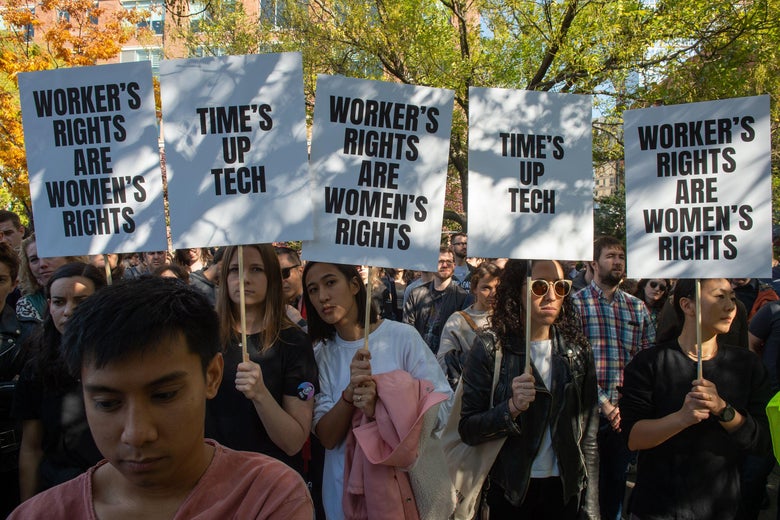Why the Google Walkout Should Put Silicon Valley on Notice
SLATE
Thousands of employees are protesting how the company has dealt with sexual harassment—the latest example of tech workers embracing activism.

Thousands of employees at more than 40 Google offices across the world are walking out of work Thursday to protest how it has dealt with accusations of sexual assault and harassment within the company. The protests follow a New York Times investigation that detailed how Andy Rubin, the creator of Android, received a $90 million exit package even after Google concluded that a sexual assault claim against him (for coercing an employee to perform oral sex in a hotel room in 2013) was credible, as well as incidents involving other executives at Google and its parent company Alphabet. One of those men, a director at Alphabet’s research and development arm X, resigned on Tuesday and did not receive an exit package.
While Silicon Valley’s major companies have always stressed that their workplaces are places where every employee has a voice, there has generally not been much collective action within their ranks. Unions are rare in the tech industry, where salaries are high and perks are abundant. But the weather seems to have changed in recent months, with large groups of tech workers joining together to protest some of their employers’ business activities. Some of that activity has been fruitful at Google, in particular: Workers successfully petitioned for the company to back out of a project to build artificial intelligence for military drones over the summer, and an employee backlash played a role in Google’s decision to fire an engineer who circulated a memo suggesting that female workers are less biologically suited to technical roles. The Google action on Thursday, probably the largest industry protest yet, suggests both a new phase of the trend as well as an example of just how adept tech workers can be in using the tools their companies create to try to hold those companies accountable.
The walkouts are scheduled for 11:10 a.m. local time in the Google offices where employees are participating, with the first taking place in Google’s offices in Singapore. The demonstration was organized by Google employees who started an internal mailing list on Friday, after the Times report was published. On Tuesday, Google CEO Sundar Pichai told employees in an email that he supports the protests and has been receiving useful feedback on ways to address what many employees see as a culture of impunity for executives at the company. One sign from the walkout in New York City read, “What do I do at Google? I work hard every day so that company can afford $90,000,000 payouts to execs who sexually harass my coworkers.”
The seven main organizers of the walkout wrote in the Cut on Thursday that the purpose of the demonstration wasn’t only to protest Google’s reported history of sheltering harassers at the company. “A company is nothing without its workers,” they wrote. “From the moment we start at Google we’re told that we aren’t just employees; we’re owners. Every person who walked out today is an owner, and the owners say: Time’s up.”
The walkout comes with a set of demands, including that Google fix pay inequities and ensure that women of color be represented at all levels across the company. Protesters are also asking that the company stop requiring employees to agree to engage in arbitration for harassment and discrimination cases that arise within the company, a practice that forces employees to waive their right to sue. They also want Google to issue a sexual harassment transparency report detailing how many incidents of sexual harassment have been reported and what kinds of exit packages employees who left as a result have received. (Pichai revealed in an email to employees last Thursday that that the company had fired 48 people, 13 of whom were senior managers, for sexual harassment over the last two years—and that none of them received exit packages.) Other demands include a companywide policy for safely reporting instances of sexual misconduct, the promotion of the company’s chief diversity officer to report directly to the CEO, and a seat for an employee representative on the board of directors.
Employees at tech companies have taken on more activist roles over the past year. When thousands of Google employees petitioned the company to back out of developing artificial intelligence for drones for the Department of Defense, the company decided not to renew its contracts. Likewise, staff protested leaked plans that the company had been working with the Chinese government to build a censored search engine. Other than its size, what’s most telling about Thursday’s protests is that the protesters want permanent, companywide policy changes, not just one-off corrections.
Employee-led activism has been ramping up across the tech industry. Amazon employees have insisted that the company’s facial recognition technologies not be sold to law enforcement. Employees at Microsoft and Salesforce have demanded that their companies no longer contract with Immigrations and Customs Enforcement and U.S. Customs and Border Patrol, two federal agencies at the heart of the Trump administration’s immigration policies. Thousands of security guards at major companies across Silicon Valley, including Google and Facebook, had their unions recognized early last year in an effort to demand wage increases. Those workers currently make between $27,000 and $37,000 a year, according to Gizmodo—though they work on campuses in areas where one-bedroom apartments cost more than $3,000 a month.
Some tech workers have been organizing across companies—suggesting the emerging architecture of a movement, not a series of ad-hoc protests. “It’s in the best interest of executives for us not to organize,” reads a statement Thursday from the Tech Workers Coalition, a group that acts as an organizing hub for people who work in the tech industry. “It’s clear the executives won’t do this for us, so we’re taking matters into our own hands.”







Follow Us!